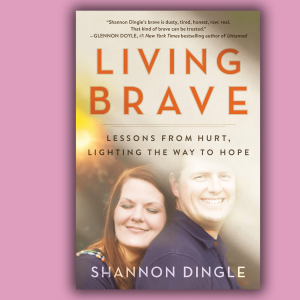
Liuan Huska is a freelance journalist and the author of Hurting Yet Whole: Reconciling Body and Spirit in Chronic Pain and Illness. She lives on ancestral Potawatomi land near Chicago.
Posts By This Author
Finding a Way Back to God After Tragedy
Shannon Dingle is a disabled activist, sex trafficking survivor, and author of recently released Living Brave. Her family’s grief over the sudden death of her husband, Lee, in July 2019 resonated with many worldwide. She discussed Living Brave with Liuan Huska, author of Hurting Yet Whole: Reconciling Body and Spirit in Chronic Pain and Illness.
LIUAN HUSKA: IT’S been almost two years since a rogue wave killed your husband, Lee, on a family beach vacation. You wrote about his death soon after it happened.
Shannon Dingle: Looking back on some of my writing, I’m so damn proud of my ability to capture where I was then. It is a record for me and my kids as much as for anyone else. I wanted to tell the story and protect how it was told.
Did the sexual abuse you experienced as a child influence how you wanted to tell your grief story? My brutal and raw honesty definitely comes from a place where I had horrific things happening that I couldn’t tell. I know how freeing it can be to put words to things. I write from a place where I know I’m the authority on what my life has been and what happened.
Mary and Other Displaced Brown Mothers
Like Mary, women the world over have had their childbirth plans disrupted by the pandemic, their path to motherhood rerouted, especially women of color.
Fueled By Faith, Not Fear
THE LAST THING that Ben Lowe could be accused of is “slacktivism,” which, as he describes in his latest book, Doing Good Without Giving Up, happens when we complain and point fingers about justice issues while being slow to take constructive action to address the situation.
From running for Congress at age 25 to helping to ignite a grassroots student environmental movement, Lowe’s track record for tackling complex and thorny problems where others would throw up their hands is remarkable. Even more remarkable is that after nearly a decade of such work, Lowe retains a gracious hope and steadfast sense of calling, despite being told by other Christians that he was being deceived by the devil, weathering bouts of burnout and depression, and continually facing entrenched systemic problems. This is why I trust him when he writes to encourage those of us whose hearts are heavy for the injustices in the world but often find ourselves stuck in the initial “slacktivist” inertia or dragged down later by opposition, burnout, and cynicism.
In Doing Good, Lowe outlines a sustainable impetus for social action and offers practices to sustain ongoing activism. We cannot be motivated by the desire to see dramatic change, he says, because this only “points people to ourselves and idolizes the change we seek.” It also ultimately lacks staying power. Instead, Lowe calls us to pursue faithfulness in our social action, which “points people to Christ ... and is ultimately the best—if not only—way to bring about the change God seeks.” Staying faithful, which the second half of the book covers, requires a continual reorientation to Christ as center through such practices as repentance, Sabbath, contemplation, and community.
Prophet in a Cracker Dress
ONE RECENT WINTER day, Nora Howell stepped out of her house in the Sandtown neighborhood of Baltimore and took a walk down the street. People in the predominantly black community did double takes as this white woman promenaded past them in a sundress made of saltine and oyster crackers. Some stared in disbelief. One man doubled over laughing. In the corner coffee shop, one of the regulars warned Howell not to walk by any homeless people because they might just eat her up.
Later Howell, a community artist and director of the neighborhood Jubilee Arts program, set the video footage taken during her walk to Mister Rogers’ classic refrain, “Won’t You Be My Neighbor?” The piece, which emerged out of Howell’s ponderings on what it means to be white living in a black neighborhood, became another part of her answer to a call: to use art to address systemic racism and bring about the kingdom of God.
From Race Riots to White Suburbia and Beyond
In 2001, Howell was an eighth grader living in a biracial community in urban Cincinnati. When race riots erupted after a young black man was shot fatally by a white police officer (sound familiar?), her family took to the streets on a prayer walk through the riots. Howell remembers being shocked and terrified, thinking, “Why do we still have race riots? Cincinnati is so far behind the times.”
In the aftermath, Howell talked with peers at school on the reality of racial tensions and observed with curiosity how white and black churches throughout the city responded. She realized race riots weren’t just a relic of the ’60s. “When you lived in a place where different racial groups interacted daily, [racial tensions] could no longer be denied or ignored,” she said.
Yet when Howell moved to suburban Chicago to attend Wheaton College, conversations on race were largely absent. “I found that very odd,” she said. She got involved in a campus group to promote awareness of racial injustice.


